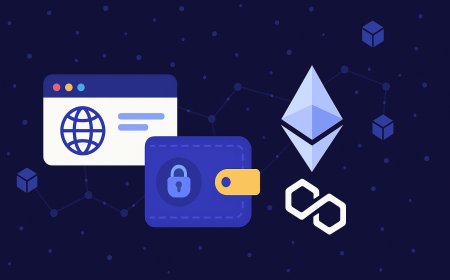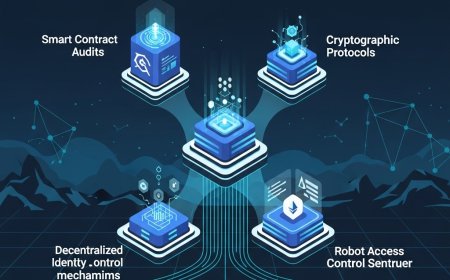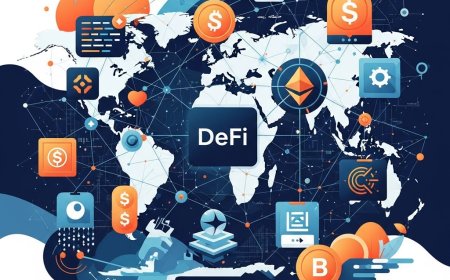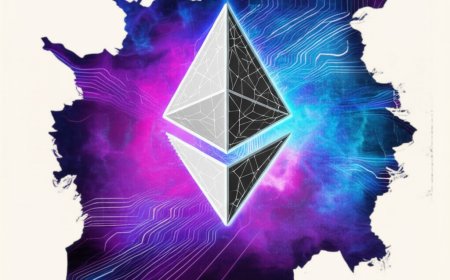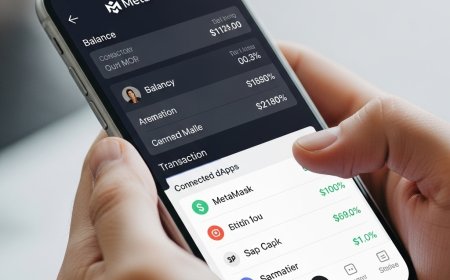What is DeFi? A Beginner's Simple Guide to Decentralized Finance
Unlock DeFi's potential! Learn what Decentralized Finance is, how it works, and explore key concepts like lending, borrowing, and staking for passive income.
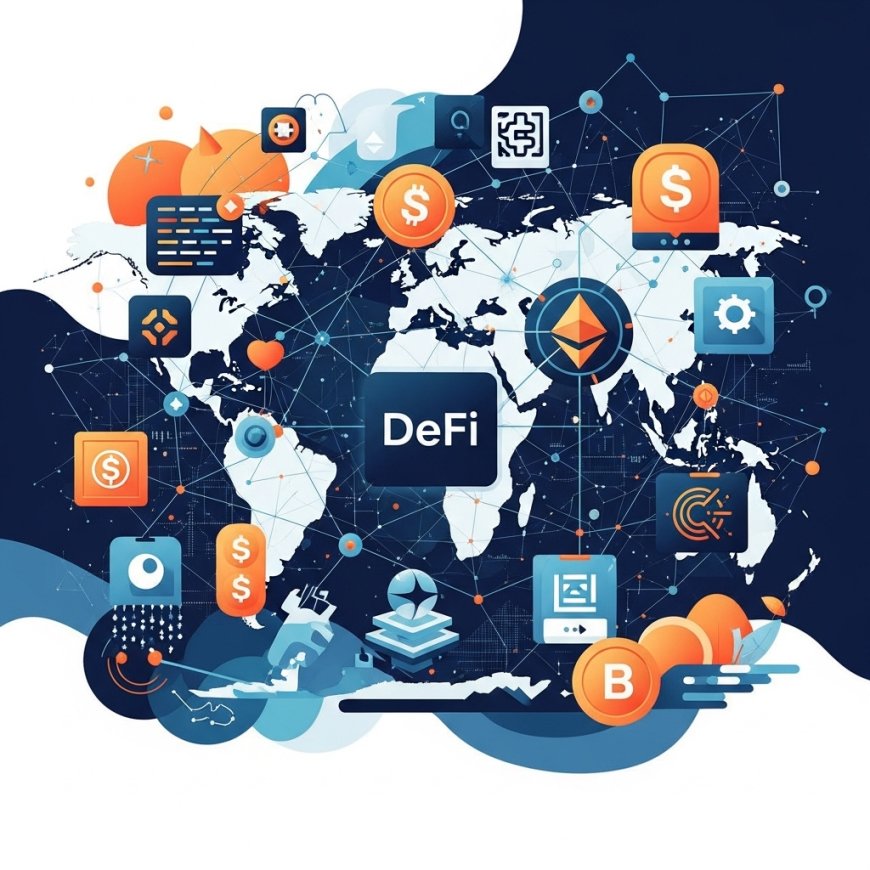
For centuries, traditional finance has been controlled by banks, brokers, and central institutions. But what if you could access financial services – like loans, savings, and trading – directly, without any intermediaries?
This is the promise of Decentralized Finance, or DeFi. Built on blockchain technology, DeFi is an open, global financial system that is accessible to anyone with an internet connection. It's a rapidly growing movement that's reshaping how we think about money and financial freedom.
If terms like "yield farming," "liquidity pools," and "staking" sound intimidating, don't worry! This guide will break down DeFi into simple, understandable concepts, showing you how it works, what you can do with it, and why it's gaining so much traction. Get ready to explore the future of finance!
What Exactly is Decentralized Finance (DeFi)?
DeFi stands for Decentralized Finance. It refers to a global, open-source financial ecosystem built on public blockchains (primarily Ethereum) that aims to recreate traditional financial services in a decentralized, transparent, and permissionless manner.
- Decentralized: No central authority (like a bank or government) controls it. It's run by code on a blockchain and governed by its community.
- Permissionless: Anyone with an internet connection and a compatible crypto wallet can access DeFi services, regardless of their location, income, or background. There are no credit checks or lengthy approval processes.
- Transparent: All transactions on the blockchain are public and verifiable, though user identities remain pseudonymous.
- Programmable: DeFi applications are built using "smart contracts," which are self-executing agreements written directly into code. This automation removes the need for intermediaries.
Think of it as an alternative financial system, running on code instead of companies.
How Does DeFi Work? The Role of Smart Contracts
The backbone of DeFi is smart contracts. These are digital contracts stored on a blockchain that automatically execute when certain conditions are met.
- Automated Agreements: Instead of needing a bank employee to approve a loan, a DeFi lending smart contract automatically processes it if the borrower meets the predefined collateral requirements.
- Trustless Transactions: You don't need to trust an intermediary; you only need to trust the code of the smart contract, which is transparent and auditable.
- No Central Point of Failure: Because these applications run on a decentralized network of computers (the blockchain), there's no single server or company that can be shut down, unlike traditional financial institutions.
Most DeFi applications (often called dApps for decentralized applications) are built on the Ethereum blockchain, but other blockchains like Solana, Avalanche, and BNB Chain are also rapidly growing their DeFi ecosystems.
Key DeFi Concepts and Services
DeFi offers a wide range of financial services that mirror (and sometimes surpass) those found in traditional finance:
-
Lending & Borrowing:
- How it works: Users can lend their cryptocurrency to others through lending protocols (e.g., Aave, Compound) and earn interest on their deposits. Borrowers can take out crypto loans, typically by over-collateralizing them with other crypto assets.
- Benefit: Earn passive income from your crypto holdings, or get liquidity without selling your assets.
-
Decentralized Exchanges (DEXs):
- How it works: DEXs (e.g., Uniswap, PancakeSwap) allow users to trade cryptocurrencies directly with each other, peer-to-peer, without needing a centralized exchange like Coinbase or Binance. They often use "liquidity pools" (see below).
- Benefit: Greater control over funds (never leave your wallet), access to a wider range of tokens, and often lower fees.
-
Liquidity Pools & Yield Farming:
- How it works: Users provide pairs of cryptocurrencies (e.g., ETH and USDC) to a "liquidity pool" on a DEX. This enables others to trade those tokens. In return for providing "liquidity," providers earn a share of trading fees and often receive additional tokens as rewards ("yield farming").
- Benefit: Earn significant passive income by contributing to the liquidity of decentralized markets.
-
Staking:
- How it works: Locking up a certain amount of cryptocurrency in a blockchain network to support its operations and security. In return, stakers earn rewards (new tokens) for their contribution. This is common in "Proof-of-Stake" blockchains.
- Benefit: Earn passive income while securing the network.
- How it works: Locking up a certain amount of cryptocurrency in a blockchain network to support its operations and security. In return, stakers earn rewards (new tokens) for their contribution. This is common in "Proof-of-Stake" blockchains.
-
Stablecoins:
- How it works: Cryptocurrencies designed to maintain a stable value, usually pegged to a fiat currency like the US dollar (e.g., USDC, USDT, DAI). They are crucial for DeFi as they provide stability in volatile crypto markets.
- Benefit: Provides a safe haven for funds during market volatility and facilitates stable transactions within DeFi.
-
Decentralized Autonomous Organizations (DAOs):
- How it works: While not strictly a financial service, DAOs are integral to DeFi. They are blockchain-based organizations governed by their members (token holders) who vote on proposals, treasury management, and protocol upgrades. Many DeFi protocols are governed by DAOs.
- Benefit: Empowers communities to collectively manage and evolve decentralized financial systems.
Why is DeFi Gaining Momentum?
- Financial Inclusion: Provides financial services to anyone, anywhere, regardless of traditional banking access.
- Transparency: All transactions are publicly verifiable on the blockchain.
- Efficiency: Automated smart contracts reduce costs and speed up transactions.
- Innovation: A rapidly evolving ecosystem constantly introducing new financial products and services.
- User Control: Users retain full custody of their funds (unless they explicitly put them into a smart contract).
Risks and Considerations in DeFi
While promising, DeFi comes with its own set of risks:
- Smart Contract Bugs: Flaws in code can be exploited, leading to loss of funds.
- Volatility: The underlying crypto assets can be highly volatile, impacting the value of your investments.
- Impermanent Loss: A risk in liquidity providing where the value of your pooled assets deviates negatively from simply holding them.
- High Gas Fees: Network congestion (especially on Ethereum) can lead to high transaction costs.
- Rug Pulls & Scams: Malicious projects can disappear with users' funds.
- Complexity: The learning curve can be steep for beginners.
Always do your own thorough research (DYOR) before investing in any DeFi protocol.
Getting Started with DeFi
Ready to explore DeFi? Here's how to begin:
- Set Up a Web3 Wallet: You'll need a browser extension wallet like MetaMask to connect to DeFi dApps.
- Fund Your Wallet: Purchase ETH (for Ethereum-based DeFi) or other relevant cryptocurrencies and send them to your MetaMask wallet.
- Research Protocols: Start with well-established and audited protocols. Explore reputable resources like CoinGecko, DeFi Llama, and reputable news outlets.
- Connect & Explore: Connect your wallet to a DeFi dApp (e.g., Uniswap to swap tokens, Aave to lend). Start small to get familiar with the process.
Conclusion: The Future is Decentralized
Decentralized Finance is more than just a trend; it's a foundational shift towards a more open, equitable, and efficient financial system. By understanding its core concepts – from smart contracts to lending, borrowing, and yield farming – you're well-equipped to navigate this exciting frontier.
Remember to prioritize security, conduct thorough research, and start with small amounts as you learn. The power of finance is now at your fingertips!
Ready to try out DeFi? Learn about setting up your [Link to MetaMask post]MetaMask Wallet[/Link] or find out more about [Link to NFTs post]NFTs[/Link] and how they fit into the decentralized landscape!
What's Your Reaction?
 Like
0
Like
0
 Dislike
0
Dislike
0
 Love
0
Love
0
 Funny
0
Funny
0
 Angry
0
Angry
0
 Sad
0
Sad
0
 Wow
0
Wow
0
